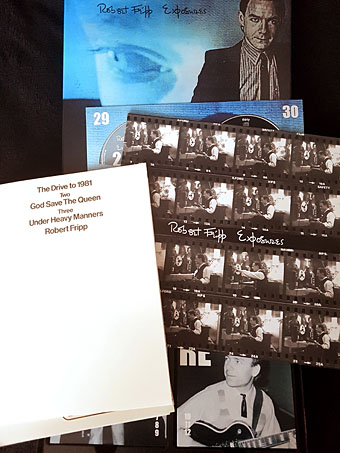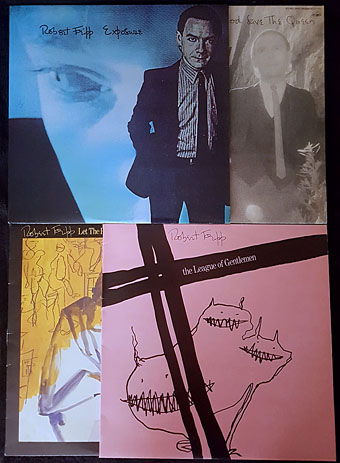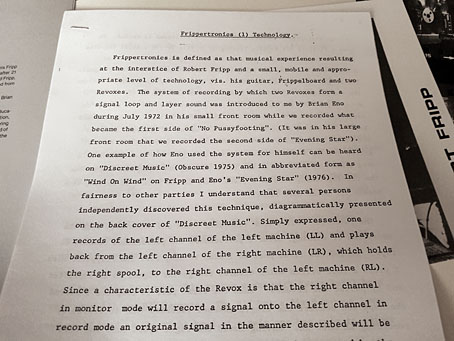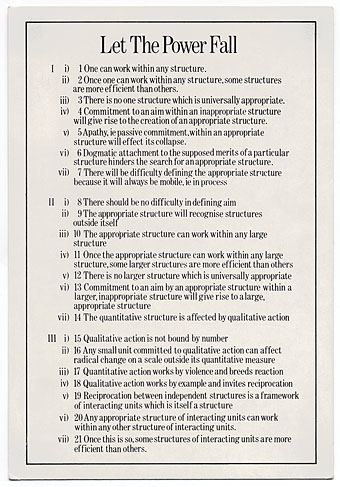This colossal collection turned up yesterday. I’m still working my way through its contents: 25 CDs, 3 DVDs and 4 blu-rays; the CDs all run for at least 70 minutes each so these alone provide about 30 hours of music. The box covers three phases of Robert Fripp’s “Drive to 1981”: his debut solo album, Exposure; his Frippertronics guitar recordings, both live and in the studio; and his short-lived New-Wave dance band The League Of Gentleman. All cult stuff in this house, obviously, you don’t buy 32 discs on a whim.
The original vinyl. Looks like I’ll have to hold on to my LoG album (see below).
Exposure is present here in multiple versions which might seem like overkill but it’s an unusual album that was compromised from the outset by record company interference. Fripp’s original intention in 1977 was for it to be released simultaneously with two connected albums, the others being Peter Gabriel II and Sacred Songs by Daryl Hall; songs from Exposure appear in different versions on the other albums, Gabriel and Hall both sing on Exposure, and Fripp produces all three works. The problem with this ambitious scheme is that Daryl Hall was subject to greater commercial pressure from his record company than were Fripp or Gabriel; RCA not only shelved the “uncommercial” Sacred Songs for three years but they also refused to let Hall sing on all the songs Fripp had planned with him for Exposure. Record company refusals also put a stop to a planned version of I Feel Love which would have been sung by Debbie Harry. In order to rescue the album several of the Hall songs were redone with new lyrics and new performances by Terre Roche and Peter Hammill, all of which has led to the contents of the album being fluid enough to sustain the various mixes which Fripp calls “Editions”. On this new set you get early drafts with extended mixes of the Frippertronic sequences, all the alternate takes including Daryl Hall’s original vocals, and a new “Fourth Edition” mixed by Steven Wilson which was much better than I expected. Wilson has had a parallel career in recent years remixing many well-known albums from the 1970s, not always to their benefit. I’ve been listening to this album for over 40 years yet the new mix contains things I’d never heard before, as well as being heavier and punchier than it’s sounded in the past.
Frippertronics explained.
But the real highlight for me here is all the Frippertronics material. I’ve always liked this period of Fripp’s career which was essentially a guitar-driven equivalent of Brian Eno’s ambient music, developing the process begun on the (No Pussyfooting) and Evening Star albums. Or it was in its “pure” form… “Applied Frippertronics” was the term given to the familiar Revox-looped guitar tones when used as a backing for disco-inspired instrumentals, and even a rather plodding and eccentric song, Under Heavy Manners, sung by David Byrne. In addition to copious recordings of pure Frippertronics there are also more of the applied variety in this set than I ever expected to hear.
There’s no point attempting a proper review of all this material, I’ll leave that to others. But there are a few surprising omissions worth noting. The original release of the self-titled League Of Gentleman album was framed by about 6 minutes of tape collage, Indiscreet I, II & III, made from Fripp’s recordings of friends and colleagues. These vanished from the cut-down CD release of the album in 1985, and they haven’t returned here. Also absent are similar taped moments that were mixed into the original versions of Cognitive Dissonance, HG Wells and Trap plus three shorter tracks, Pareto Optimum I, Pareto Optimum II and Ochre, all of which were tape-loop pieces with an organ as the instrument. I bought the League Of Gentleman album when it was released so it feels incomplete without the shorter musical pieces and the “indiscretions”. The omission of the latter is thrown into further relief by the proximity of Exposure which contains similar taped voices (Brian Eno, Fripp’s mother, the ubiquitous JG Bennett) scattered between the songs, yet all of these have been present in every release of the album. Worst of all, since it’s always been a favourite song, is the absence of Danielle Dax’s vocal from the new mix of Minor Man. The original sounds like this.
Another omission is this list of principles which appeared on the back of the Let The Power Fall album and also on a postcard inside the album. It’s not really essential to appreciation of the music but it was a statement of Fripp’s philosophy in the late 1970s, and his concern with being a “small, mobile, intelligent unit” working in opposition to those he termed “dinosaurs”, ie: the big record companies like RCA who were often working against the best interests of their artists. The booklet inside the Exposures box reproduces all the artwork from the original albums plus the artist photos that appeared as postcards with some of the releases but not this item. Even if Fripp no longer agrees with its sentiments it would at least seem historically relevant.
I think I’m done now with the big DGM boxes, and yet… If there was another one collecting all the studio and live recordings that Fripp recorded with David Sylvian in the 1990s I’d be tempted. The First Day album is one I like more than most of the King Crimson music from the same period, and the pair happened to play a version of Exposure (the song) on their tour. There’s at least one high-quality bootleg from that tour in existence, plus odd tracks that only appeared on EPs, so who knows what else might be in the archives. How about it, Mr Fripp?
Further reading/viewing:
• Exposure promo video
• Exposures contents list
• The Exposure pages at Elephant Talk
• Robert Fripp interviewed in Synapse magazine, 1979 [PDF]





In a reply to a previous post I was somewhat disparaging of this huge set because it would duplicate some of what is already available but I did succumb. It’s due to be shipped here in the States next month. Exposure is why I became a lifelong Fripp fan. If it had not been for Exp I think i would view 70s King Crimson the way I now view those early 70s Yes albums – great old friends to reconnect with occasionally. Fripp is always interesting and his collaborations and guest spots are some of his best work.
The recent Soundscapes Music for Quiet Moments box is very beautiful but Frippertronics has an intensity that it lacks, probably because of the old analog technology. And I find I prefer the standalone loops to the ones overlaid with solos (although Fripp in full flight is hard to beat).
One release that I hope doesn’t get completely lost is a collaboration between Fripp and his wife Toyah Wilcox, a spoken word recording of Frank Stockton’s The Lady or the Tiger. Toyah gives a fine reading but the highlight is one of Fripp’s best backing loops punctuated by a solo that ebbs and flows under the story. Perhaps there are copyright issues? Or Stockton’s estate was scandalized? I do own the original LP but a nicely mastered digital recording would be much appreciated.
You’re in for a treat, I’ve been stunned by some of the contents, like the “Eurotronics” disc which is a collection of long, funky instrumentals with Frippertronics as the main music. Too often when things are left unreleased you can understand why, but things like this could have been released as albums in their own right. An amazingly productive period.
I’ve always enjoyed the minimalism of the basic Frippertronics recordings. They’re seldom as abrasive as the early Fripp & Eno albums but still sound like guitar music, which you can’t really say about his later Soundscapes, good as they are. I’d often wished he’d recorded more like Let The Power Fall so this is all a dream come true.
Yes, but… Daryl Hall?
Fripp’s taste, obviously. I wouldn’t have paid any attention to Hall if he hadn’t been involved with the three-album project but he acquits himself well enough on Exposure. (I do prefer the versions of the songs with the other vocalists, however.) And without Fripp’s interest you wouldn’t have a song like Babs And Babs which proceeds in a very predictable manner then goes off into a world of its own at 3:30:
https://www.youtube.com/watch?v=BUySLoHPV10
I have to echo the wish for a Sylvian/Fripp box set. It would be good to have all the b-sides and extras recorded during the studio sessions compiled in one place. As I believe Fripp holds the rights to the studio and live album “Damage” (both were re-released by Panegyric recently) I am sure the original multi-tracks could be located for surround mixes for those who like that sort of thing. I have seen Trey Gunn recently brandishing a cassette tapes of early sessions which lead to the Sylvian/Fripp studio album. Also, I do know Fripp has on a few occasions proclaimed he has in his possession some very good performances of the Sylvian/Fripp/Gunn trio. So I think there is plenty of material from around that period to produce another typical DGM big box. Here’s hoping!
That sounds encouraging. I’d missed the DGM reissues of the album and live album but then I’ve got those already so wouldn’t have paid the new versions much attention.
There’s definitely one pro-recorded live performance out there since this was broadcast on UK TV in 1994. I was actually searching for the cassette tape I made from the video recording recently but was unable to find it. It may be the same concert that was released on video in Japan but hasn’t been reissued since:
https://www.discogs.com/master/274971-David-Sylvian-And-Robert-Fripp-Japan-Night
After searching for reviews of the new Fripp box, I stumbled across your entry and am happy to find a fellow soul that is as intimate with these albums as I have been for 40 years. I didn’t think many cared about this period of his work that I’ve been obsessed with for so long. I agree with your comments about having to keep your original LoG release due to the omission of so much of it’s structure. I’ll be doing the same.
My main reservation about buying this box is simply that, like all the other DGM sets, it is a CD-only release. I’ll pick up these album’s new vinyl presses plus the Washington Square Church set and hope that more of the set is issued on vinyl, or becomes accessible in a streaming format.
Reading your posts further, I realize that we are fellow souls in another respect: I know Victor Valla and his wife as we live in the same area in Litchfield County, Connecticut. I’ve exhibited his work at our local library on occasion and am myself a bookseller.
Thanks, Garth. I’m never too worried about the lack of vinyl since I don’t play it very much. I have a decent hi-fi but I listen to music a lot when I’m working so CDs have always been more user-friendly on that score, you don’t have to change them every 20 minutes.
That aside, you couldn’t really have as much as these boxes contain if vinyl was the format unless you wanted something that weighed a ton while retailing at $1000 or something. I’m still working my way through the Frippertronics blu-rays which contain hours and hours of music, more than he’s ever made available before.
That’s quite a coincidence about Victor Valla! I’d known about his covers for a while but only recently decided to make a feature of them.
The Lady or the Tiger recording is technically part of the Guitar Craft challenge series of performance tasks and so it would likely be released as part of a Guitar Craft master compendium, which would be truly awesome to see.
I found this review looking for confirmation of all the missing tape collage bits from League of Gentlemen, and glad to see it truly was missing. I agree, I shall not lose the vinyl. Those recorded bits made the album much more human, comical and carefree.
There are some real gems in this box, one of my favorite unheard discoveries was Exposure IV featuring flute and saxophone instead of vocals. By far my favorite of the song and one that I really wish had made it into an official release – it feels like a real bridge between the old Crimson and new sounds.
The Frippertronic library demonstrated the tremendous risk and frustration with self that RF must have engaged on the touring trail, from stretching tape to odd audio issues of every stripe, the twin tape machines clearly had a mind of their own and I can only imagine how much humility this exercise put him through on the road – suffering as both performer and essentially ad hoc engineer during the performances.
The Big Box of Wonders did arrive this morning as promised. I really haven’t had a chance to explore properly. I went right for the Let the Power Fall remaster on disk 20. Sounds terrific! I was surprised and delighted that Fripp included a second version of 1984 (track 8) that includes the solo. This turns out to be one of my favorite Frippertronics solos, originally released as ‘The New World’ in 1986 on one of the League of Crafty Guitarists releases. The other Frippertronics solo I hope is buried somewhere in this set is his demonstration on a pre-MTV American music show from 1979 called ‘The Midnight Special’.
I’m not particularly a fan of Daryl Hall but Sacred Songs is pretty special. It makes a fine companion to Exposure. It’s Peter Gabriel II that doesn’t quite live up to expectations.
I’m still working my way through the hours and hours of Frippertronics on the BR discs…
I agree about Gabriel’s second album, his first two solo albums have never interested me very much, the third and fourth ones were much better; even he admitted that the version of Here Comes The Flood on Exposure was better than the original recording.
For a much longer and in-depth look at Exposures, here’s my piece, published at All About Jazz a few weeks ago. Less personal than this author’s fine piece, it consequently dovetails nicely with it, I think: https://www.allaboutjazz.com/exposures
Thanks, John, that’s a very detailed review. I agree with the comment about Fripp being a kind of rock equivalent of Miles Davis, the Exposure period was a real break with the past.